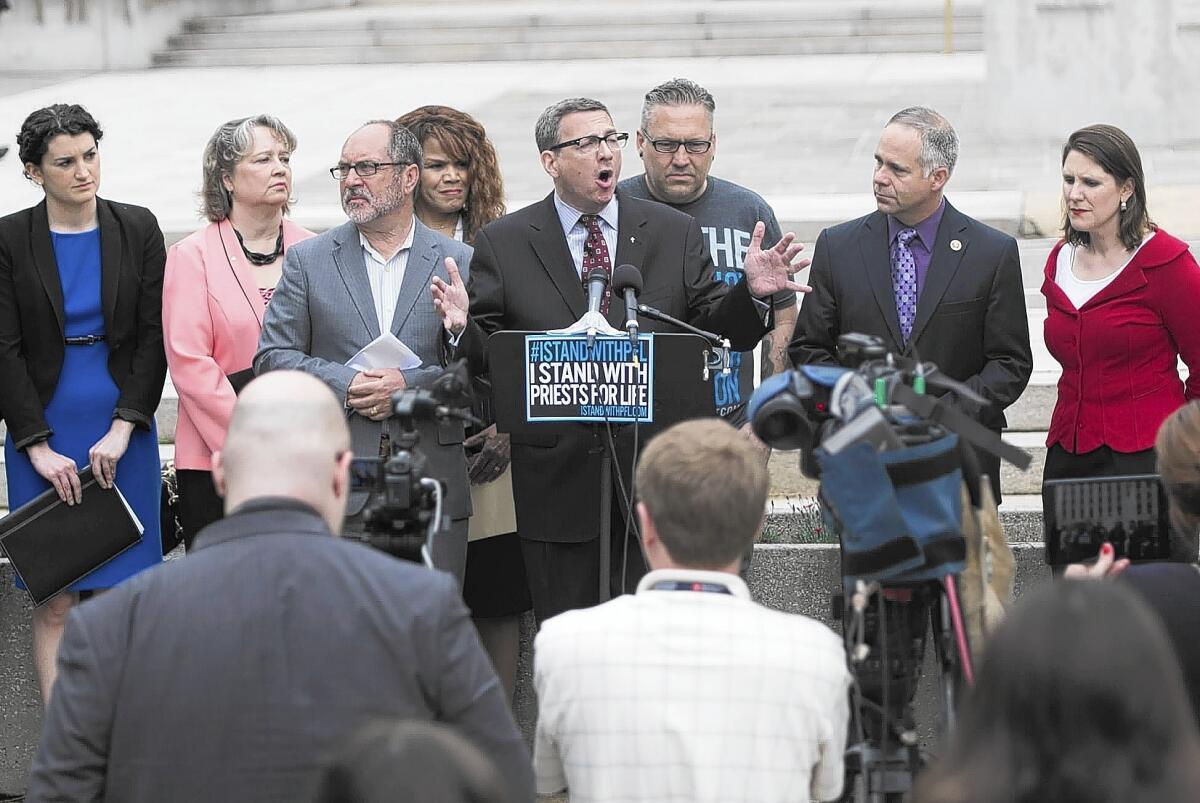New legal battle opens over Obamacare and contraceptives

Even as the Supreme Court weighs one challenge to the Obama administration’s rule that female employees be offered health plans that include a full range of contraceptives, lawyers for several prominent Catholic groups are seeking to set up a potential Round 2 in the fight.
In arguments Thursday before a U.S. appeals court, lawyers for the Catholic Archdiocese of Washington clashed with administration attorneys over whether Catholic schools, colleges and charities should have a complete religious exemption from the so-called contraceptive mandate that forms part of President Obama’s healthcare law.
For now, the legal fight between religious freedom and women’s health is being played out in a friendly forum for the administration. The three-judge panel has two new Obama appointees: Judges Nina Pillard and Robert Wilkins.
But theirs will not be the final decision. That will likely come from the Supreme Court, probably next year.
The justices already heard arguments in March over whether private companies may refuse to pay for contraceptives if their owners cite a religious objection. A decision in that case, known as Hobby Lobby, is due by late June.
But separately, dozens of religiously affiliated nonprofit groups, including schools and colleges, have sued and raised a somewhat different challenge.
Rules issued under the health law in effect create three groups of companies and institutions. Most employers, including those such as Hobby Lobby whose owners have strong religious beliefs, are covered by the mandate to provide a full range of contraceptive devices. At the other end of the spectrum, churches are entirely exempt.
A third category, which includes religious nonprofit groups like Catholic schools and colleges, falls in between. Under a compromise offered by the administration last year, those employers need not pay for contraceptives, but are required to sign a form that certifies they have a religious objection. Insurers, not the employer, would pay for the contraceptive coverage in those cases.
For now, that requirement has been put on hold for most Catholic institutions. On New Year’s Eve, Justice Sonia Sotomayor issued an order temporarily shielding the Little Sisters of the Poor from complying with the regulation, and other justices handed down similar orders.
The Catholic groups say that even signing a form goes too far. Doing so would “make them morally complicit” in violating Catholic doctrine, attorney Noel Francisco told the judges, because their insurers would then step in.
The judges said they had no doubt the Catholic leaders had a sincere religious objection to providing contraceptives. However, they did not seem persuaded that the bishops’ claim met a key test in federal law — whether religious freedom was being placed under a “substantial burden” by the administration’s plan.
“Even writing a letter to the secretary to opt out? You would object to that as well?” asked Judge Judith W. Rogers, a President Clinton appointee.
“Yes, if their employees get the contraceptive coverage,” answered Robert Muise, a Michigan attorney who represented Priests for Life, one of the several groups challenging the requirement.
The two sides sounded far apart, and the outcome could potentially affect tens of thousands of employees in schools, colleges and hospitals.
But at other moments, the dispute seemed to turn on a minor matter of paperwork. The attorney for the Catholic Archdiocese of Washington said he would have “no problem” with a system that allowed female employees, rather than their employers, to sign a form telling the government and an insurer that they wanted contraceptive coverage. This could achieve the same end, but the church officials would have no part in arranging the coverage.
If the case had come before the U.S. Circuit Court of Appeals for the District of Columbia last year, the Catholic groups probably would have had a warmer reception. But over the last several months, the appeals court, which had been dominated by Republican appointees since the 1980s, has undergone a remarkable change.
When Senate Democrats voted to end filibusters of judges, three new Obama appointees were confirmed in quick succession to the D.C. Circuit. Now, seven of the court’s 11 active judges are Democratic appointees.
The effect of that change was even more apparent in a second case heard Thursday challenging the Affordable Care Act.
More than 40 House Republicans joined a lawsuit brought by the Pacific Legal Foundation that has drawn attention in conservative circles. It says that the law should be thrown out because it imposes a tax and the legislation was initiated in the Senate.
“What happened here is unprecedented and unique,” said Timothy Sandefur, a lawyer for the foundation. The Constitution says “all bills raising revenue shall originate in the House of Representatives,” he noted.
But the judges sounded unimpressed. They said the aim of the healthcare bill was to encourage more people to get health insurance, not to raise revenue.
If the claim is tossed out by the appeals court, the challengers can ask the Supreme Court to hear it.
More to Read
Start your day right
Sign up for Essential California for news, features and recommendations from the L.A. Times and beyond in your inbox six days a week.
You may occasionally receive promotional content from the Los Angeles Times.






